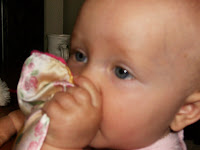 Mama A always says that even though Beatrice is Mama's girl for now, she'll end up being Daddy's girl for the rest of her life.
Mama A always says that even though Beatrice is Mama's girl for now, she'll end up being Daddy's girl for the rest of her life.That may be true, but right now she's definitely Mama's girl, hands down, and we've been experiencing separation anxiety full force.
It's not that we leave her alone much with others - her babysitter Elyse has had little problem with Bea missing Mama too much once a week, and my Friday Daddy-care day works out nicely with me and Bea bonding.
This weekend we've been at Mama's 20-year high school reunion and had events Friday and Saturday nights. Her family - mother, sister and niece - have watched her before and Beatrice really likes them all (including playing with her 2-year-old cousin Braxton).
However, last night was a tough one. We were hoping to make it past 10:00 p.m., which is an hour past our usual bedtime. Two calls later about Bea's blood-curdling "where the frick is Mama" cries - one at 8:30 and one at 9:30, and that was all she wrote.
No boogie shoes for Mama and me.
We got Beatrice to bed with fuzzy and thumb, and then realized we hadn't paid our bar tab at the reunion dinner. Whoops. Mama's mom drove her back down to the restaurant to take care of it.
Hey, at least she still got a dance in with her friends, but how much fun can you have with your mother? (wink)
When it comes to separation anxiety, quite a bit. At least between 6 months and 3 years old.
I found some great strategies at KidsHealth.org that can help ease kids and parents through this sometimes difficult period:
- Timing is everything. Try not to start day care or child care with an unfamiliar person when your little one is between the ages of 8 months and 1 year, when separation anxiety is first likely to appear. Also, try not to leave when your child is likely to be tired, hungry, or restless. If at all possible, schedule your departures for after naps and mealtimes.
- Practice. Practice being apart from each other, and introduce new people and places gradually. If you're planning to leave your child with a relative or a new babysitter, then invite that person over in advance so they can spend time together while you're in the room. If your child is starting at a new day care center or preschool, make a few visits there together before a full-time schedule begins. Practice leaving your child with a caregiver for short periods of time so that he or she can get used to being away from you.
- Be calm and consistent. Create a exit ritual during which you say a pleasant, loving, and firm goodbye. Stay calm and show confidence in your child. Reassure him or her that you'll be back — and explain how long it will be until you return using concepts kids will understand (such as after lunch) because your child can't yet understand time. Give him or her your full attention when you say goodbye, and when you say you're leaving, mean it; coming back will only make things worse.
- Follow through on promises. It's important to make sure that you return when you have promised to. This is critical — this is how your child will develop the confidence that he or she can make it through the time apart.
No comments:
Post a Comment